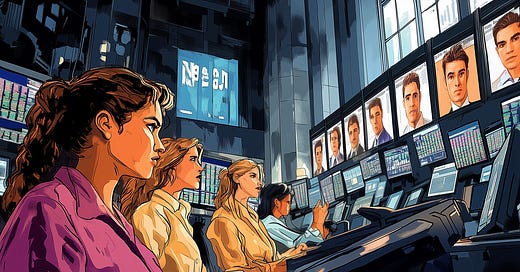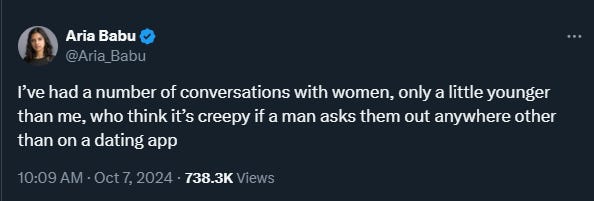The best antidote to dating discourse is to date like you’re in a market, which you are. These are fundamentally different modes of interacting with other people. Discourse seeks attention: no matter whose or by what means. In a market you seek something (or someone) specific, and you need to provide what they seek in return. Start thinking like a market and the discourse loses its grip on you.
Dating discourse is an egregore evolved for survival. It recognizes a threat when it sees one. The discourse has several attacks against the idea of “dating markets” which mostly rely on painting the phrase with negative connotations. But markets aren’t just a “vibe”, they’re a real social structure with dynamics and rules.
Here are some things people say about “dating markets”:
“Market” is dehumanizing; it makes people into commodities to be traded.
This is a fundamental misunderstanding: we aren’t the wares in the dating marketplace. We are the traders. Markets are for exchanging value and it’s only humans who value anything.
It’s shallow and misguided to reduce everything to a single “sexual marketplace value” that’s mostly just looks.
If there was only one thing anyone valued, there wouldn’t be a market — we’d all just sit on our stockpiles of that one thing with nothing to exchange it for. A market doesn’t mean lining up every sex by “SMV” so the 218,735th hottest man marries the 218,735th hottest woman.
Dating is a market because the dating each of us wants is different: different traits in our partners, different types of relationships, different things we offer in return. The challenge of this wild bazaar is finding your partner through the chaos. It’s not about accumulating SMV tickets to cash in at the prize machine.
Relationships aren’t supposed to be transactional.
They aren’t. The transaction is in establishing a relationship: what you offer is the promise of being in a relationship with you, and what you receive is the promise of a relationship with the other person. The marketplace is where the two find each other and leave the market together. The rest of your relationship shouldn’t consist of some quid-pro-quo exchange.
Markets want to clear, not to keep you shopping and haggling forever.
Ugh, sounds like capitalism.
What exactly do you think the alternative is?
Market Making
The first step to dating in a market is to understand what your dating market actually is. You’ll find many definitions: your geographic area, your age range, dating app, sexual orientation, job, community, etc. These are good approximations, but not quite precise.
Your dating market are the people you might meet and want to date, and all the people they might meet and want to date. This usually means people who live near you and share the appropriate demographics. But that’s not what’s important.
The actionable definition of your dating market isn’t static. Your dating market changes not just when you move cities or make new friends, but also when you change your understanding of who you’re looking for and of what they are looking for.
When I moved to New York, I kept hearing about how it’s a tough dating market for women because they (slightly) outnumber men in the city. But these global ratios are only relevant if you think your dating market has 8 million people. It doesn’t.
Plenty of my male rationalist friends want a girl who shares their nerdy philosophical interests. If these interests are narrowed down to tech, AI, and LessWrong, they set themselves a dating market which is 80% male regardless of the city they’re in. Supplementing with Tinder doesn’t help — it selects against thoughtful nerdiness and against the sort of woman who seeks someone like them.
I suggest they branch out to adjacent interests like authentic relating, life sciences, and cultural criticism — to create a more gender-balanced market that still selects for mutual compatibility. Market size, gender ratio, likelihood of a good match: these are all important.
I had a Chinese friend who only dated men who made more than her own salary, which was $350,000 a year last I spoke to her. There are many more men than women among top earners, but markets are defined by people who want to date each other, not by income brackets. Rich men are interested in a much broader group of women than just fellow one-percenters, and these women are also interested in them. My friend was cornering herself into a smaller and more daunting market with every raise she earned at work.
Markets are where supply meets demand. You’re in a good dating market if people who offer what you want (like nerdy interests or 1%er income) are plentiful and what they want (like 1%er income or nerdy interests) is rare. And vice versa. It doesn’t matter as much how big your census metropolitan area is or what the ratio of all singles is in it.
Everything you do in dating, from how you discuss it with friends to what you wear to the corner store, has an impact on who you select for and on what you offer them. This includes dating norms, like exclusivity-by-default vs. delaying “the talk”, or expecting to hook up on the first few dates vs. waiting to be established. You are constantly shaping your own dating market, for better or for worse.
The second major arc of Second Person will talk about doing this shaping consciously, selecting yourself instead of being adversely selected. Thinking like a trader means being aware of selection forces everywhere.
A similar logic applies to writing. I’ve been asked numerous times who my target demo for Second Person is and how many of them you there are. I have no idea, I don’t check IDs at the door. Are you a single person tired of the typical self-help claptrap? A nerd who wants a more philosophical dating discourse? A reader of Scott Alexander who wishes Scott was like, 100 times hornier? I can’t really know. I don’t really care either. There’s not much I can do to affect the total demand for my writing, only the supply.
I assume most people read no more than 10 Substacks. And I don’t think there are 10 Substacks who are writing better than me in my specific niche, because I’ve been searching for years and if there were I’d be reading them already. As long as I write well enough to be a top-10 choice for whoever is looking for this sort of thing, I’m in a good writing market.
Make yourself appealing to the partners you seek and ignore everyone else — that’s how you find yourself in a great dating market.
Arbitrage
Here’s an observation about dating in 2024:
The discourse asks: who is to blame for this? The options: blame women, blame men, blame young people, blame boomers, blame corporations, blame technology, blame modernity. It’s always the same question (and the same list of culprits).
The trader asks: how do I profit? They know two rules of the market:
Perfect competition drives profit to zero.
Every inefficiency is an opportunity.
“Perfect competition” in a dating market would be akin to an omniscient matchmaker setting everyone with a partner of equal desirability. “Profit” means getting a better date for yourself than the omnimatcher would grant you. It requires some market inefficiency, some condition that prevents mutually desirable transactions dates from happening. An easy way to spot inefficiencies is seeing what the discourse is bitching about today.
A new norm stating that approaching a girl in person is “creepy” is an inefficiency:
Some guys want to flirt in person but are afraid of being judged.
Some women do want to be approached and are missing out on guys who are scared off by this new norm.
Some women are approached predominantly by the obnoxious and the oblivious since they are the only ones not scared off.
From here, the profit strategy is straightforward.
If you’re a guy whose natural style is gentle and unobtrusive: engage with young women gently and unobtrusively! You no longer have to fight through a crowd of aggressive suitors to talk to a girl. Being understated is no longer taken as meekness or lack of confidence. Be friendly, enjoy the banter, find common interests, connect with no pressure to pose or answer any ultimatums. If you get along, you can ask for her social media handle and ask her out explicitly over text the next day.
The new norm raised the social acceptance of your best flirting strategy — it’s great for you!
If you’re a guy whose natural style is assertive and bold: find the women who love bold assertiveness! This used to be difficult, but now it’s straightforward: it’s the women who complain online and off about all the soyboys too scared to make the first move and where have all the real men gone. Bonus: women who feel this way cluster together, with obvious correlations on political affiliation, dress style, etc. Find the spaces where the counter-norm prevails and do your thing.
The new norm makes it easier to spot women who will respond to your best flirting strategy — it’s great for you!
If you’re a woman who really wants someone assertive and bold: drop a hint about being displeased with the new norm. It can be subtle, the guys you want will catch it. The upside to pick-me behavior is that you get picked!
The new norm raised the bar for male boldness, so that guys who approach you in person are selected more on the trait you care about — it’s great for you!
If you’re a woman who doesn’t care about assertiveness: go talk to guys! Whereas before the upside of this was limited (if the guy didn’t approach himself, he was likely uninterested), now the risk-reward has shifted in your favor. You have fewer aggressive suitors to fend off, and more freedom to pick a guy based on the traits you care about. He’ll be grateful to talk to you — he has few other options!
The new norm put the power in your hands to have your selection of men — it’s really great for you!
This new norm is letting guys feel like badasses for the mundane act of asking a girl’s number and giving girls the improved outcomes that come with being the initiators in a stable-matching algorithm. It’s a win-win!
Unless, of course, you’re discourse-brained. In that case, you lose. Primarily — your agency. Every dating grievance is a trap for complainers and an opportunity for doers. And doers go to the market.
Markets are how we care for people we don’t know. Dating markets are how we get to know them.






> Bonus: women who feel this way cluster together, with obvious correlations on political affiliation, dress style, etc. Find the spaces where the counter-norm prevails and do your thing.
I feel like I'm completely drawing a blank on how to do that. Also, if you mean "target right-wing women" here, I don't know how compatible I could be with someone like that.
Ok this is fun and at times insightful. It's a little bit trapped in the optimizer mode though, with the profit seeking suggestions. I have, and have had, the urge to optimize, achieved some measure of success (married to the woman of my dreams, mother of 2/3rds of my kids) but also failure (separated from said woman). I wholeheartedly endorse acknowledging the reality of the dating market, but I suspect the wise approach has less to do with thinking like a professional trader, and more to do with thinking of the market as a tool that can help you if you get a grip on what you actually want/need